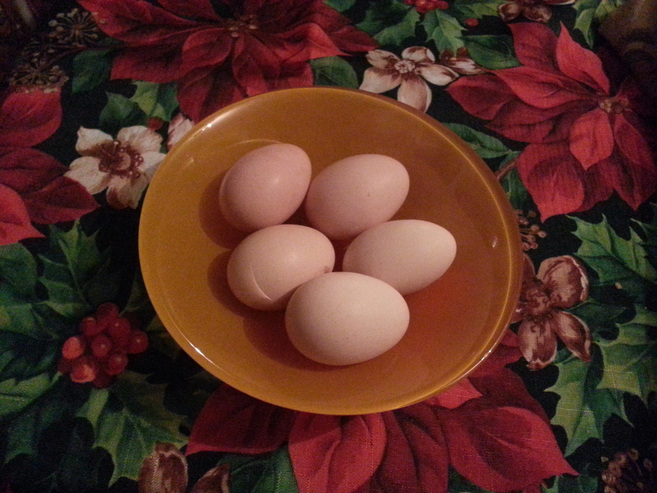 These eggs are Partridge Chantecler. The foremost one was laid today and so far is the largest laid. The birds are young pullets and have just started to lay. They do not receive any supplemental light, though there is a red heat lamp in their coop.
These eggs are Partridge Chantecler. The foremost one was laid today and so far is the largest laid. The birds are young pullets and have just started to lay. They do not receive any supplemental light, though there is a red heat lamp in their coop. The hardiest birds hands down are the white Chanteclers. They were bred in Canada by the monks, and his idea was to produce a very hardy, good sized dual purpose (meat and egg) bird. They are not pretty like some of the other breeds, just plain white with small combs and no wattles (hangy down thingys by their beaks). Those parts are what freeze on other breeds, so it is a good thing not to have them. But, they have not layed eggs this winter. The Partridge Chanteclers have layed a few and just in the last week, there have been two or three eggs a day. The eggs are small because the chickens are pullets, that is, they are young and just starting. Laying eggs takes a bit of practice and patience and hurts at first, like having a baby. So small eggs are better to start with than big ones. I am hoping the white Chanteclers will also start laying and the Ameraucanas, which lay blue/green eggs will too. Those white Chanteclers have been sleeping in the waterfowl house, which is an open three sided deep shelter. It is not warm in there, but it is protected from the wind and no snow gets in. The birds could go into either coop, but they do not seem to mind the cold. Bonus points to the white Chanteclers, pretty or not, for being winter hardy. Now let's see some eggs.
There is a rooster for the Ameraucanas and one for the white Chanteclers. I am hoping both will breed the others and I will end up with a super hardy winter tough mixed flock laying some blue and some brownish eggs. The bantams are crosses and they are as hardy as the Partridge Chanteclers, plus they have been laying the odd egg as well. Even though I check the nesting boxes frequently, at these frigid temperatures, the eggs have been freezing before I can harvest them, but I have managed to collect most. If I see a hen in the box, I go back and check often. So far, it is working.
Part of the sustainability of raising chickens is that no supplemental light or heat should be necessary for the right flock and they should still produce some eggs in winter. In the old days, the coops were hardly insulated, if at all, and the chickens survived just fine. Some were not watered, but left to eat the snow and they do do that, but I still give them water. The bantams do not drink it, preferring the snow. The only problem with the bantams is that they are so light, they do not produce a meat carcass. Otherwise, they are the best foragers and are very independent, all summer feeding themselves. Next winter, a huge manure/compost pile will be located in the chicken yard. The idea is that the heat from the pile will keep it thawed all winter and the chickens can forage and eat the worms and bugs and other tasty morsels from it, reducing their need for grain based food in winter. If it works, perhaps, grain can be eliminated completely.
The white Chanteclers are the breed to choose for winter hardy birds. Hands down. Second are the Ameraucanas and the Partridge Chanteclers, tied. Thank you chickens for your eggs, your bodies and your foraging. The farm would not be the same without you.

 RSS Feed
RSS Feed